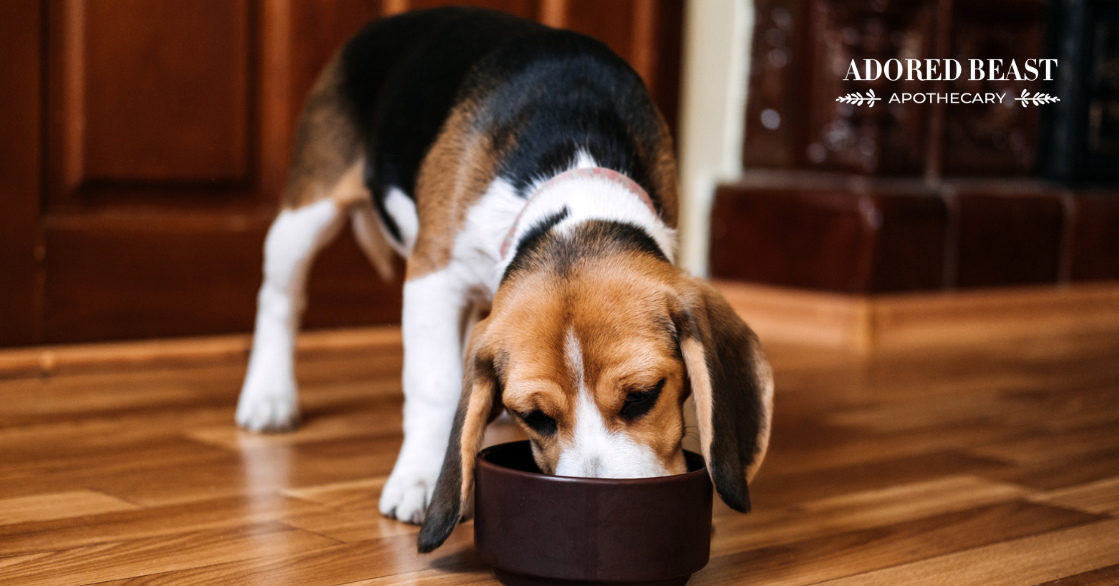When most people hear the term acid reflux, they think of human discomfort after a big, greasy meal. It’s uncomfortable and annoying, for sure. But did you know that dogs can suffer from this problem too? GERD in dogs is a real issue for our canine companions.
In fact, Gastroesophageal Reflux Disease (GERD) is more common in dogs than many pet parents realize, and it can make them miserable. The good news? With the right understanding and care, you can help your dog feel better naturally.
What is GERD in Dogs?
GERD in dogs (and people, too) happens when stomach acid (and sometimes partially digested food) flows back into the esophagus – the tube connecting the mouth to the stomach. This backward flow irritates the lining of the esophagus, leading to inflammation and discomfort.
In a healthy digestive system, a ring of muscle at the bottom of the esophagus (the lower esophageal sphincter) keeps stomach contents where they belong. But if this muscle weakens or relaxes at the wrong time, reflux occurs.
Why does this happen? Well, GERD can be triggered by several factors, including:
- Hiatal hernia – when part of the stomach pushes up into the chest cavity
- Anesthesia – can relax the esophageal sphincter during surgery
- Obesity – extra pressure on the abdomen may contribute to reflux
- Certain foods – fatty, spicy, or highly processed foods can irritate the digestive tract
- Food sensitivities or allergies – can cause inflammation in the GI tract
- Chronic vomiting – wears down the esophageal lining over time
- Esophageal injury – from swallowing something sharp or caustic
Symptoms of GERD in Dogs
The signs of GERD in dogs can be subtle at first. Your adored beast can’t exactly tell you they’re feeling yucky, so it’s important to watch for any changes in their eating habits, behaviour, or comfort level. Common symptoms include:
- Frequent burping or gagging
- Excessive swallowing or lip licking (often after eating)
- Regurgitation (bringing up food without warning, not the same as vomiting)
- Bad breath (from stomach acids and partially digested food)
- Coughing or throat clearing
- Loss of appetite
- Whining or discomfort after meals
- Weight loss (in chronic cases)
If symptoms are persistent or severe, it’s a good idea to talk to your veterinarian to rule out other issues such as esophageal disease, ulcers, or even certain cancers.
Natural Ways to Support a Dog with GERD
While severe GERD may require some veterinary help, many mild to moderate cases can be managed or improved with gentle, natural approaches.
1. Dietary Adjustments
- Low-fat, easily digestible foods: Avoid greasy, fried, or heavily processed dog foods.
- Moist foods: Adding water or broth to meals can make digestion easier.
- Elimination diet: If food sensitivities are suspected, keep a diary, track food, and remove triggers.
2. Meal Timing
When GERD is at play, you want to pay attention to when you feed. Keeping a routine can really help keep the body on a normal schedule. Feed small, frequent meals, which can reduce the amount of acid produced at one time. Wait at least 2–3 hours after eating before vigorous activity or bedtime to allow proper digestion.
3. Weight Management
If your dog is overweight, a gradual, healthy weight loss plan can help reduce abdominal pressure and acid reflux. Now, that doesn’t mean going all in and cutting calories in half – you want to go slow and steady. We have lots of tips for healthy weight loss in this post.
4. Supportive Herbs and Supplements
Several different supplements can offer soothing support to the digestive system and often significantly reduce or relieve symptoms of GERD in dogs.
- Slippery elm – coats and soothes the esophagus and stomach lining.
- Marshmallow root – supports mucosal healing.
- Licorice root (DGL) – helps reduce inflammation in the GI tract.
- Probiotics – balance gut bacteria and support digestion.
- Digestive enzymes – assist in breaking down food more efficiently.
5. Reduce Stress
Stress can worsen digestive problems in dogs. You want to address any stressors in your dog’s environment and reduce them if possible. Keep mealtimes calm, provide plenty of mental enrichment, and ensure your dog has a predictable routine. Exercise can also help reduce stress – just make sure it’s not too close to feeding time!
GERD in dogs isn’t just a little post-dinner discomfort – it can significantly affect your pet’s quality of life. By making thoughtful changes to diet, routine, and overall health support, you can help protect their digestive system and keep that tail wagging after every meal.












